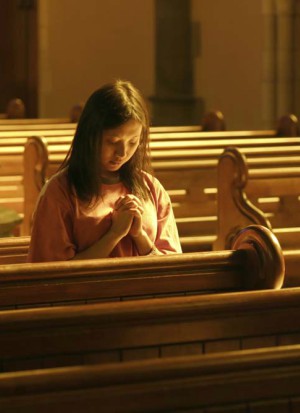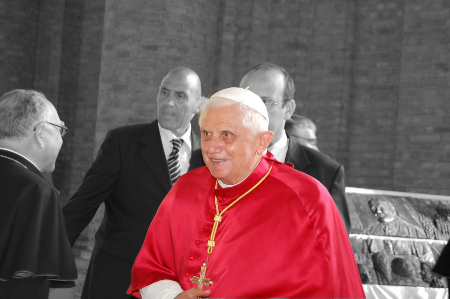Cardinal Ratzinger On Europe's Crisis of Culture (Part 2 of 4)
FREE Catholic Classes
"A Confused Ideology of Freedom Leads to Dogmatism"
SUBIACO, Italy, JULY 28, 2005 (Zenit) - Here is a translation of the lecture given in Italian by Cardinal Joseph Ratzinger, now Benedict XIV, in the convent of Saint Scholastica in Subiaco, Italy, the day before Pope John Paul II died.
This lecture took place April 1, when he received the St. Benedict Award for the promotion of life and the family in Europe.
Part 3 of this lecture will appear Friday.
***
Let us take a closer look at this opposition between the two cultures that have characterized Europe. In the debate on the Preamble of the European Constitution, this opposition was seen in two controversial points: the question of the reference to God in the Constitution and the mention of the Christian roots of Europe. Given that in article 52 of the Constitution the institutional rights of Churches are guaranteed, we can be at peace, it is said.
But this means that in the life of Europe, the Churches find a place in the realm of the political commitment, while, in the realm of the foundations of Europe, the imprint of their content has no place. The reasons that are given in the public debate for this clear "no" are superficial, and it is obvious that more than indicating the real motivation, they conceal it. The affirmation that the mention of the Christian roots of Europe injures the sentiments of many non-Christians who are in Europe, is not very convincing, given that it relates, first of all, to an historical fact that no one can seriously deny.
Naturally, this historical mention has a reference to the present. To mention the roots implies indicating as well the residual sources of moral orientation, which is a factor of Europe's identity. Who would be offended? Whose identity is threatened?
The Muslims, who in this respect are often and willingly brought in, do not feel threatened by our Christian moral foundations, but by the cynicism of a secularized culture that denies its own foundations. Neither are our Jewish fellow citizens offended by the reference to the Christian roots of Europe, in as much as these roots go back to Mount Sinai: They bear the sign of the voice that made itself heard on the mountain of God and unite with us in the great fundamental orientations that the Decalogue has given humanity. The same is true for the reference to God: It is not the mention of God that offends those who belong to other religions, but rather the attempt to build the human community absolutely without God.
The motivations of this twofold "no" are more profound than one would think from the reasons offered. They presuppose the idea that only the radical Enlightenment culture, which has reached its full development in our time, could be constitutive for European identity. Next to this culture, then, different religious cultures can coexist with their respective rights, on the condition and to the degree in which they respect the criteria of the Enlightenment culture, and are subordinated to it.
Culture of rights
This Enlightenment culture is essentially defined by the rights of freedom; it stems from freedom as a fundamental value that measures everything: the freedom of religious choice, which includes the religious neutrality of the state; freedom to express one's own opinion, as long as it does not cast doubt specifically on this canon; the democratic ordering of the state, that is, parliamentary control on state organisms; the free formation of parties; the independence of the judiciary; and, finally, the safeguarding of the rights of man and the prohibition of discriminations. Here the canon is still in the process of formation, given that there are also rights of man that are in opposition, as for example, in the case of the conflict between a woman's desire for freedom and the right of the unborn to live.
The concept of discrimination is ever more extended, and so the prohibition of discrimination can be increasingly transformed into a limitation of the freedom of opinion and religious liberty. Very soon it will not be possible to state that homosexuality, as the Catholic Church teaches, is an objective disorder in the structuring of human existence. And the fact that the Church is convinced of not having the right to confer priestly ordination on women is considered by some up to now as something irreconcilable with the spirit of the European Constitution.
We ask you, humbly: don't scroll away.
Hi readers, it seems you use Catholic Online a lot; that's great! It's a little awkward to ask, but we need your help. If you have already donated, we sincerely thank you. We're not salespeople, but we depend on donations averaging $14.76 and fewer than 1% of readers give. If you donate just $5.00, the price of your coffee, Catholic Online School could keep thriving. Thank you.Help Now >
It is evident that this canon of the Enlightenment culture, less than definitive, contains important values which we, precisely as Christians, do not want and cannot renounce; however, it is also obvious that the ill-defined or undefined concept of freedom, which is at the base of this culture, inevitably entails contradictions; and it is obvious that precisely because of its use (a use that seems radical) it has implied limitations of freedom that a generation ago we could not even imagine. A confused ideology of freedom leads to dogmatism, which is showing itself increasingly hostile to freedom.
We must, without a doubt, focus again on the question of the internal contradictions of the present form of the Enlightenment culture. But we must first finish describing it. It is part of its nature, in so far as culture of a reason that, finally, has complete awareness of itself, to boast a universal pretense and conceive itself as complete in itself, not in need of some completion through other cultural factors.
Both these characteristics are clearly seen when the question is posed about who can become a member of the European community and, above all, in the debate about Turkey's entry into this community. It is a question of a state, or perhaps better, of a cultural realm, which does not have Christian roots, but which was influenced by the Islamic culture. Then, Ataturk tried to transform Turkey into a secular state, attempting to implant in Muslim terrain the secularism that had matured in the Christian world of Europe.
Universal culture?
We can ask ourselves if that is possible. According to the thesis of the Enlightenment and secular culture of Europe, only the norms and contents of the Enlightenment culture will be able to determine Europe's identity and, consequently, every state that makes these criteria its own, will be able to belong to Europe. It does not matter, in the end, on what plot of roots this culture of freedom and democracy is implanted.
And, precisely because of this, it is affirmed, that the roots cannot enter into the definition of the foundations of Europe, it being a question of dead roots that are not part of the present identity. As a consequence, this new identity, determined exclusively by the Enlightenment culture, also implies that God does not come in at all into public life and the foundations of the state.
Thus everything becomes logical and also, in some sense, plausible. In fact, what could we desire as being more beautiful than knowing that everywhere democracy and human rights are respected? Nevertheless, the question must be asked, if this secular Enlightenment culture is really the culture, finally proposed as universal, that can give a common cause to all men; a culture that should have access from everywhere, even though it is on a humus that is historically and culturally differentiated. And we also ask ourselves if it is really complete in itself, to the degree that it has no need of a root outside itself.
Contact
Catholic Online
https://www.catholic.org
CA, US
Catholic Online - Publisher, 661 869-1000
info@yourcatholicvoice.org
Keywords
Ratzinger, Pope, Culture, Benedict, God, Conscience, Moral
We ask you, humbly: don't scroll away.
Hi readers, it seems you use Catholic Online a lot; that's great! It's a little awkward to ask, but we need your help. If you have already donated, we sincerely thank you. We're not salespeople, but we depend on donations averaging $14.76 and fewer than 1% of readers give. If you donate just $5.00, the price of your coffee, Catholic Online School could keep thriving. Thank you.Help Now >
More Catholic PRWire
Showing 1 - 50 of 4,716
A Recession Antidote
Randy Hain
Monaco & The Vatican: Monaco's Grace Kelly Exhibit to Rome--A Review of Monegasque-Holy See Diplomatic History
Dna. Maria St. Catherine Sharpe, t.o.s.m., T.O.SS.T.
The Why of Jesus' Death: A Pauline Perspective
Jerom Paul
A Royal Betrayal: Catholic Monaco Liberalizes Abortion
Dna. Maria St.Catherine De Grace Sharpe, t.o.s.m., T.O.SS.T.
Embrace every moment as sacred time
Mary Regina Morrell
My Dad
JoMarie Grinkiewicz
Letting go is simple wisdom with divine potential
Mary Regina Morrell
Father Lombardi's Address on Catholic Media
Catholic Online
Pope's Words to Pontifical Latin American College
Catholic Online
Prelate: Genetics Needs a Conscience
Catholic Online
State Aid for Catholic Schools: Help or Hindrance?
Catholic Online
Scorsese Planning Movie on Japanese Martyrs
Catholic Online
2 Nuns Kidnapped in Kenya Set Free
Catholic Online
Holy See-Israel Negotiation Moves Forward
Catholic Online
Franchising to Evangelize
Catholic Online
Catholics Decry Anti-Christianity in Israel
Catholic Online
Pope and Gordon Brown Meet About Development Aid
Catholic Online
Pontiff Backs Latin America's Continental Mission
Catholic Online
Cardinal Warns Against Anti-Catholic Education
Catholic Online
Full Circle
Robert Gieb
Three words to a deeper faith
Paul Sposite
Relections for Lent 2009
chris anthony
Wisdom lies beyond the surface of life
Mary Regina Morrell
World Food Program Director on Lent
Catholic Online
Moral Clarity
DAN SHEA
Pope's Lenten Message for 2009
Catholic Online
A Prayer for Monaco: Remembering the Faith Legacy of Prince Rainier III & Princess Grace and Contemplating the Moral Challenges of Prince Albert II
Dna. Maria St. Catherine Sharpe
Keeping a Lid on Permissiveness
Sally Connolly
Glimpse of Me
Sarah Reinhard
The 3 stages of life
Michele Szekely
Sex and the Married Woman
Cheryl Dickow
A Catholic Woman Returns to the Church
Cheryl Dickow
Modernity & Morality
Dan Shea
Just a Minute
Sarah Reinhard
Catholic identity ... triumphant reemergence!
Hugh McNichol
Edging God Out
Paul Sposite
Burying a St. Joseph Statue
Cheryl Dickow
George Bush Speaks on Papal Visit
Catholic Online
Sometimes moving forward means moving the canoe
Mary Regina Morrell
Action Changes Things: Teaching our Kids about Community Service
Lisa Hendey
Easter... A Way of Life
Paul Spoisite
Papal initiative...peace and harmony!
Hugh McNichol
Proclaim the mysteries of the Resurrection!
Hugh McNichol
Jerusalem Patriarch's Easter Message
Catholic Online
Good Friday Sermon of Father Cantalamessa
Catholic Online
Papal Address at the End of the Way of the Cross
Catholic Online
Cardinal Zen's Meditations for Via Crucis
Catholic Online
Interview With Vatican Aide on Jewish-Catholic Relations
Catholic Online
Pope Benedict XVI On the Easter Triduum
Catholic Online
Holy Saturday...anticipation!
Hugh McNichol











 Daily Readings for Thursday, April 18, 2024
Daily Readings for Thursday, April 18, 2024 St. Apollonius the Apologist: Saint of the Day for Thursday, April 18, 2024
St. Apollonius the Apologist: Saint of the Day for Thursday, April 18, 2024 Aspiration: Prayer of the Day for Thursday, April 18, 2024
Aspiration: Prayer of the Day for Thursday, April 18, 2024

